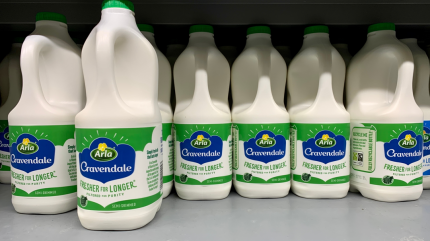
Dairy major Arla Foods has pressed for government backing to address a shortage of qualified workers in the UK farming sector.
Bas Padberg, the managing director for Arla in the UK, had a warning – potential food shortages on shelf and higher prices – unless resolutions are taken.

Discover B2B Marketing That Performs
Combine business intelligence and editorial excellence to reach engaged professionals across 36 leading media platforms.
“Farmers are responsible for feeding a nation with over 98% of people having milk in their fridge. What we’re seeing, is the real impact of these workforce shortages on our farming industry, whether that’s in higher costs or lower milk production,” Padberg said today (13 August).
“The effect of this is ultimately going to be seen in the price and availability of products on the supermarket shelves, affecting the millions of people that rely on dairy as a source of nutrition in their diet.”
According to figures from the annual Arla on-farm workforce survey, which was conducted across the cooperative’s 1,900 British farmers, one in six farmers trying to fill vacancies got few or no responses from qualified applicants.
As a result of the ongoing labour shortages, 13% of farmers said they will leave farming altogether in the next 12 months if the situation does not improve.

US Tariffs are shifting - will you react or anticipate?
Don’t let policy changes catch you off guard. Stay proactive with real-time data and expert analysis.
By GlobalDataFurthermore, as the largest dairy company in the UK, Arla said “much more urgent action is needed to meet the scale of the challenge”.
Now in its fifth year, the Arla on-farm workforce survey also found that the challenge of recruiting and retaining skilled staff is “just as prevalent” now as it was five years ago.
More than 47% of farmers are aged 55 and over, and only 3% of farmers are first-generation, whilst more than 66% have passed their farms down over at least four generations.
Padberg added: “We know the government has acknowledged the problem and welcome a focus on talent and development as part of the forthcoming food strategy.”
He stressed there is a need to “act quickly”, and to put in place “practical steps that the industry, the education sector and government can take together to support more opportunities for inclusion and growth”.
Padberg continued: “We really see a bright future for UK food manufacturing, and this is signalled in the £390m ($529.1m) investment we are making in our sites.
“But as with farming, we have to look at what is impacting our ability to recruit skilled workers and find ways of working together with the government to protect the security of our food.”





